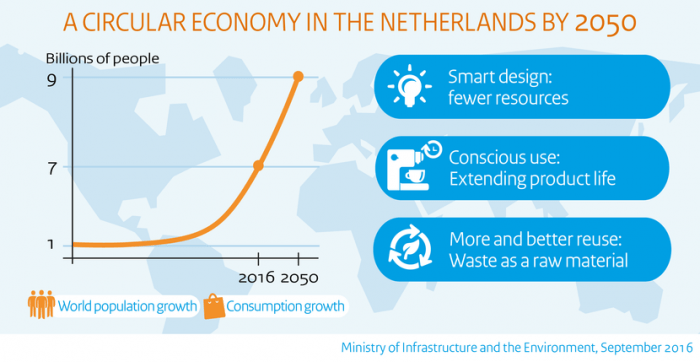A Circular Economy in the Netherlands by 2050
Dutch national raw materials agreement to foster circular economy
A national raw materials agreement will be concluded to ensure that the Dutch economy will be running completely on reusable raw materials by 2050. Minister Dijksma (Infrastructure and the Environment) and Minister Kamp (Economic Affairs) have made agreements with the Dutch business community, government authorities, and NGOs aimed at realising a one hundred percent circular economy. In addition, Environment Minister Dijksma is freeing up 27 million euros for improved waste separation, in order to ensure that discarded products are reused as valuable raw materials rather than end up at a landfill. This money will also be used to fund new innovations aimed at improving the recycling capability of products.
Champions in recycling
Minister Dijksma: ‘We will need an additional planet if we continue to extract scarce raw materials from the earth at this rate. Currently, products often cannot be recycled or are even designed for short-term use only. We need to rid ourselves of this throw-away mentality. Fortunately, in the Netherlands we are champions in recycling, and with this raw materials agreement we are making the shift to a circular economy a reality.’
The Netherlands is overly dependent on raw materials from abroad, such as metals for the electronics industry. By fully recycling end-of-life smartphones, for instance, the metals can be reused in new phones. Construction companies must be encouraged to reuse their demolition waste from old buildings in their new buildings. Agreements to that effect are also set down in the raw materials agreement. Since reuse requires far less energy than the processing of new raw materials, the environment also benefits from lower emissions of greenhouse gases.
27 million to reduce waste
The 27 million that will be made available at the initiative of Minister Dijksma will be used, inter alia, to make it easier for the 7000 primary schools in the Netherlands to separate their waste. Furthermore, environmentally harmful products will be tackled so that alternatives will emerge for non-recyclable packaging such as that used for crisps and soups. To get even more sustainability initiatives off the ground, the Cabinet will also sit down with the three largest banks which have already stated their willingness to support investments in circular projects. Currently, innovative companies sometimes find it difficult to acquire financing for circular innovations which have not yet been proven in practice.
Minister Kamp: ‘The ambition of the Cabinet is to adopt a more effective, smarter, and more profitable approach to the utilisation of scarce raw materials and residual flows, together with the business community, knowledge institutes, and government authorities. Thus we are building a circular economy that will not only benefit our climate, but also generate income and jobs. Studies have shown that up to 2023, the circular economy in the Netherlands will account for a market value of 7.3 billion euros and 54,000 jobs. So, opportunities galore for our business community.’
How to separate household waste needs to become more transparent and easier for residents, and the municipalities play a major role in this. At the moment, too much reusable waste simply ends up in regular waste bins, mainly in larger cities. New sustainable raw materials will also be given a boost through the raw materials agreement. For example, bridges and floodgates can be made from composite material, using grass that grows in the Netherlands as raw material.
Source: government.nl
14 September 2016